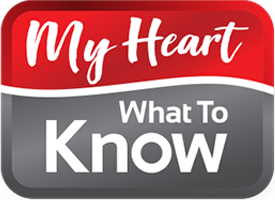Heart disease is the second leading cause of death in Canada behind cancer. That’s a sobering statistic – but there’s some good news to go along with it: many of these deaths can be prevented.
The first step is knowing your own risk.
There are some risks that you can’t control – like whether heart disease runs in your family. If you have a close relative who has heart disease at age 50 or younger, that’s something to pay attention to, says Dr. Joseph Hill, Chief of Cardiology at UT Southwestern Medical Center in Dallas, Texas. That puts you in a higher risk group. Men are at a higher risk than women, and overall, our risk generally progresses as we age.
Gaining an understanding of your own risk is the foundation of making a plan to reduce the chance of developing heart disease.
When doctors talk about heart disease, they’re primarily talking about “plaque buildup in the arteries, in the coronary arteries that leads to chest pain, angina, and ultimately could lead to heart attack or stroke,” says Dr. Ian Neeland, Director of the Center for Cardiovascular Prevention at University Hospitals Cleveland Medical Center. This buildup takes place slowly over time – which gives us the opportunity to intervene with healthy behaviors that can alter the course of that buildup.
So what are the risk factors we can do something about?
HIGH CHOLESTEROL
It’s important to keep tabs on your cholesterol level. “Hardening of the arteries — development of cholesterol buildup in the heart arteries — is the most common form of heart disease,” says Dr. Hill. “The heart is a pump that sends blood to the whole body. But there are three arteries that make a U-turn to feed the heart,” he explains. “And for reasons that we don’t entirely understand, cholesterol builds up in those arteries. It starts to build up in elementary school and it tracks and accumulates all through life. And that ultimately can culminate in a heart attack.”
Dr. Hill says you can bring your cholesterol down perhaps 10% with diet and exercise, but there are also effective medications that can reduce your cholesterol. “Your cholesterol — the bad cholesterol, the LDL cholesterol — should be below 3.5 mmol / L.” Talk to your doctor about what cholesterol target is right for you.
“Turns out most people are unable to achieve that just with lifestyle, sadly. If your LDL is too high, you should talk with your physician about medication, because we can definitely get that number down,” Dr. Hill advises.
HIGH BLOOD PRESSURE
Having high blood pressure is another risk factor, and it’s one that doctors also have a remedy for. Blood pressure, which measures the pressure against the walls of the arteries, is evaluated with two numbers. The first, or top, number measures the pressure as your heart squeezes or pumps, and the second, or lower, number denotes the pressure as the heart rests between “beats.” Your blood pressure should be at or below 120/80. Medications that have been used effectively and safely for decades can bring it down and keep your blood pressure in a healthy range.
Like high cholesterol, high blood pressure (otherwise known as hypertension) is a condition that can creep up on you – progressing in the background without outward symptoms. That’s why it’s important to get regular annual checkups and take note of these important numbers. Ask your doctor about what your numbers mean for your heart health.
EXCESS WEIGHT
Carrying extra weight is another risk factor, and it’s one we can do something about ourselves. And before readers groan, Dr. Tiffany Powell-Wiley, a heart doctor who has researched the link between excess weight and heart disease, would like to tell you that even a little change here can go a long way. “Even losing 5% of your body weight can have a huge impact,” she says. Plan to add some activity in your day, because being sedentary, as many of us are who work at desks, is also a risk factor.
Getting some aerobic exercise and losing even a little weight have positive impacts on both cholesterol and blood pressure too – so it’s a win/win!
Dr. Powell-Wiley knows how difficult it can be to work exercise into our busy lives. While she recommends getting 30 minutes of activity in a day, that can be a goal to work toward if you’re not doing anything at all now. “Any is better than none,” she encourages. “And that doesn’t have to mean 30 minutes of consecutive activity.”
Dr. A. Shekhar Pandey, the founder of Cambridge Cardiac Care in Ontario, hosts an annual healthy heart day to give his community the most up to date actionable information about how they can stay heart healthy. “Your heart’s a muscle. Any muscle gets stronger when you work it,” he reminds us. He’s emphatic about daily exercise. “You need to try to incorporate regular structured exercise and physical activity into your daily life. Physical activity also helps to lower blood pressure and reduces the risk of diabetes, both of which contribute to heart disease development,” Dr. Pandey says. (Talk to your doctor before beginning an exercise program to make sure it’s right for you.)
DIET
Watching your diet goes hand in hand with these healthy lifestyle habits that help prevent heart disease. Doctors agree that what’s known as the Mediterranean diet is the healthiest choice for your heart. It includes lots of vegetables, lean protein and healthy fat.
Dr. Grace Chua, staff cardiologist at MacKenzie Health in Ontario who is passionate about educating patients about prevention, explains how the Mediterranean diet balances out. “When we look at the plate, we want half of it as fruits and vegetables.” Then, a quarter of the plate should be whole grains.” Why? “The higher the fiber content, the better, because it really slows down the absorption of sugars into your body. And then a quarter of it is protein,” she says. But not just any protein. “By protein, I mean good, healthy protein. So we would choose more chicken and fish over red meat because red meat has higher fat and cholesterol,” she says. Nuts, seeds, tofu, and legumes like beans and lentils are also good protein choices.
DIABETES
Diabetes is another risk factor, so if you have it, you must work with your doctor to control the sugar levels in your blood. And even if you don’t have diabetes, pay attention to the amount of sugar you’re consuming. Dr. Chua says to avoid simple sugars.
“So when you’re thinking of carbohydrates to eat, you don’t want the white stuff that really can make a spike in your sugar right after you eat it,” she says. And she recommends avoiding sugary drinks. They have a lot of calories and not much nutrition – the so-called “empty” calories. “Don’t drink your sugar… eat it as fruits and vegetables, but don’t drink it,” she counsels. ‘You’d be surprised how much sugar is in what we drink.”
ALCOHOL OVERUSE
As long as we’re on the subject of drinks, let’s talk about alcohol use. Doctors say to tread lightly here. “Because these days we know that any amount of alcohol may not be great for your health,” says Dr. Chua. Limiting your use of alcohol is a good idea, because alcohol can lead to weight gain and a buildup of fat around your middle.
INADEQUATE SLEEP
Alcohol also disrupts your sleep patterns, and getting inadequate sleep is another risk factor for cardiovascular disease. The general recommendation is 7-8 hours of sleep a night for adults. Sleep is essential for a great number of reparative processes of the body.
STRESS
Dr Pandey lists unmanaged stress as a risk factor, too. “Incorporating physical activity also helps to reduce stress levels and improve overall cardiovascular health, so managing stress is an important part of heart disease prevention,” he notes. He knows that’s not always easy to accomplish. “Sometimes stress and anxiety can be too much, though, and there are exceptional resources available in our communities. You need to speak to your health care provider if you’re struggling with managing stress and anxiety. There are resources available to help.” One of the benefits of tackling any of these risk factors is that they are all interlinked. Getting more exercise will help with sleep, and aerobic activity alone will reduce stress.
TOBACCO USE
Smoking of any sort is bad news for your heart. Health care providers have never stopped urging people not to smoke, yet some worrying trends have emerged recently. “Unfortunately, since the Covid-19 pandemic hit there has been a significant increase in Canada of use of tobacco products, both cigarettes as well as vaping,” laments Dr. Pandey. “Both cigarettes and e-cigarettes damage the heart. Smoking is a major risk factor for heart disease. It damages the heart, blood vessels, leads to more plaque formation, but it also directly leads to blood clots — things that trigger the heart attack [and] the stroke.”
Dr. Pandey is strongly encouraging about our ability to control this disease that he says takes the life of one Canadian every seven minutes. “Prevention starts with you,” he emphasizes. “We can reduce the risk of cardiovascular events by 90%. It’s within us to do that.”
Ninety percent is a lot!
Not only can we know our risk factors – we can do something about them and make a real difference for our long-term heart health.
—
An important step towards better health for many people is reaching a healthier weight, which can reduce the risk of cardiovascular disease. To find a physician near you who specializes in weight management, click here.
—
All the information provided on this site is for educational purposes only and is not a substitute for professional medical advice, diagnosis, or treatment. My Heart – What To Know is not a healthcare provider or clinic. ALWAYS consult with a qualified healthcare provider regarding any questions you may have about a medical condition. Never disregard professional medical advice or delay in seeking it because of something you have read on this website. If you think you may have a medical emergency, call 911 or go to the nearest emergency room immediately. No physician-patient relationship is created by this website or its use.
This article was sponsored by Novo Nordisk Canada. All content is created independently by My Heart – What To Know with no influence from Novo Nordisk.

